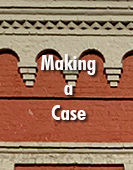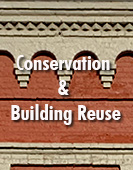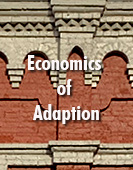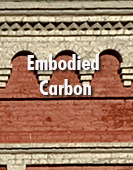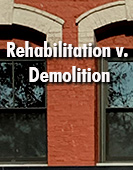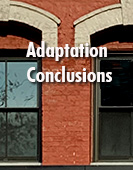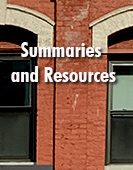- Heritage 101
- Advocacy
- Accessibility for Historic Places
- Climate & Sustainability
- Cultural Maps
- Heritage Place Conservation
- Heritage Policy & Legislation
- Homeowners
- Intangible Cultural Heritage
- Reconciliation
- Indigenous Cultural Heritage
- Setting the Bar: A Reconciliation Guide for Heritage
- 1. Heritage and Reconciliation Pledge
- 2. Acknowledging Land and People
- 3. Celebrating Days of Recognition and Commemoration
- 4. With a Commitment to Learn
- 5. Committing to Strategic Organizational Diversity
- 6. Mission-Making Room for Reconciliation
- 7. Possession, Interpretation, Repatriation and Cultural Care
- 8. Shared Decision Making
- 9. Statements of Significance and other heritage planning documents
- 10. Heritage Conservation Tools, Local Government Act
- Racism: Do Not Let the Forgetting Prevail
- Taking Action: resources for diversity and inclusion
- Webinars On-Demand
Climate Adaptation : Conservation and Building Reuse are Climate Action
Making a case to leverage existing and historic buildings for zero net carbon
2. Conservation and Building Reuse are Climate Action
The Intergovernmental Panel on Climate Change (IPCC) notes that “over the whole building stock, the largest portion of carbon savings by 2030 is in retrofitting existing buildings” (B. Metz, et al).4
Older, traditional buildings are often more “inherently sustainable” than contemporary buildings, given their traditional construction techniques, durable materials, emphasis on passive approaches to occupant comfort and repairable components.4
According to a Canadian Commission on Building and Fire Codes recent Task Force report, Authorities Having Jurisdiction (AHJs) have expressed the desire for a variety of tools to support their policy objectives and are increasingly turning to building codes to address their most pressing social policy goals, such as climate change resilience.
There is an increasing interest in BC, Canada and abroad to use regulation as a tool to address the shortfalls of new construction and the existing building stock. For example, jurisdictions are increasingly turning to more ambitious building codes as a means of reducing energy use and, in turn, greenhouse gas emissions (GHG) of buildings. Although the application to existing buildings is stated in the National Building Code (NBC), jurisdictions often only apply the NBC to the design and construction of new buildings.5
The development of National Model Codes for existing buildings could be a key component of improving the performance of existing buildings at the time of alterations, working toward provincial, territorial, and federal long-term policy goals. In the absence of consistent regulatory measures regarding the improvement of building performance at the time of alterations, or non-regulatory measures encouraging these improvements, many existing buildings will be left unchanged for years to come.
(Note: The Province of BC is revising the building code, specifically for existing buildings, to incorporate new energy efficiency standards for building upgrades in collaboration with Codes Canada. Heritage BC supports this initiative, with some caveats pertaining to protection of character-defining elements of designated heritage buildings.)
Is there a way to better position existing and historic buildings for reductions by 2030?
Architecture 2030’s Road Map 2050 to Zero Emissions include action items guidelines for existing buildings in developed countries, such as renovating a minimum of 2-3% of the total existing building stock each year to meet energy use intensity (EUI) of 50% below the regional average, for each building type.6 The goal was to have 80% carbon reduction by 2020 and carbon neutral by 2030.
In the last decade, however, most jurisdictions, including British Columbia, have fallen behind. It is therefore essential to increase that amount of total building stock being retrofitted for zero-carbon to a significantly higher rate than 2-3% per year.6
This means that a major push on building renovation and decarbonization is now a necessity. Programs that BC can bring forward to further enhance the feasibility and attractiveness of deep green rehabilitation to existing and historic buildings would be useful.
In the area of energy improvements for existing buildings, continuing with the status quo vs. a significant set of programs to boost decarbonization, could also have a big impact on whether BC and Canada can achieve specific policy goals, such as our commitment to the Paris Climate Agreement. Canada’s Building Sector accounts for a quarter of final energy demand and a fifth of our energy-related carbon emissions; building codes are an opportunity to reduce and eliminate significant energy waste.7
20% of Canada’s built heritage was lost between 1970 and 2000. This is almost entirely due to demolition and new construction, which have had a tremendous impact on the environment. Construction and demolition generate ~ 35% of Canada’s landfill waste.
Demolitions produce 20-30 times more waste material per sq. m. than reno or new construction; 20% of Canadian landfill is occupied by construction waste; 50% of that waste is salvageable and 45% recyclable. Refurbishing existing buildings can reduce Canada’s waste stream by at least 6%, since renos to existing buildings have similar energy consumptions as for typical new builds.7
While the case for building and renovating green buildings has been proven from financial and environmental perspectives, it is time to scale up solutions, including promoting building renovation that has measurable impact. Prior focus was on the operational carbon of buildings which accounts for 28% of global emissions but embodied carbon accounts for a further 11%.8
A study comparing life cycle carbon emissions for the refurbishment versus demolition and new build of two properties was conducted by Carrig International for English Heritage and determined that the carbon emissions for both were comparatively lower using a 60-year Reference Study Period (RSP) due to the high embodied carbon emissions associated with the demolition and construction of the new build. They also performed considerably better in terms of Marginal Abatement Cost (MAC) and Savings to Investment Ratios (SIR), indicating that it would be more cost-effective and attractive as a policy than new-build, and cheaper to make attractive to developers and homeowners.9
[4] National Trust for Canada. Making Reuse the New Normal: Accelerating the Reuse and Retrofit of Canada’s Built Environment. 2020.
[5] Canadian Commission on Building and Fire Codes. Final Report-Alterations to Existing Buildings: Joint CCBFC/PTPACC Task Group on Alterations to Existing Buildings. National Research Council Canada, 2020.
[6] Architecture 2030. Roadmap to Zero Emissions: Submission to the AD HOC Working Group on the Durban Platform for Enhanced Action. 2014.
[7] Efficiency Canada. “What You Need to Know About the New Building Codes.” Efficiency Canada (blog). February 4, 2020.
[8] World Green Building Council. Building a Better Future, Annual Report. 2018-2019.
[9] Carrig Conservation International. Understanding Carbon in the Historic Environment, Scoping Study Final Report. Historic England, 2019.

